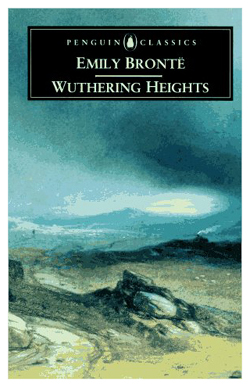|
|
| |
| |
| |
| From
Chapter 9 |
|
| |
My love for Heathcliff resembles the eternal rocks
beneath: a source of little visible delight, but necessary. Nelly, I am
Heathcliff! He’s always, always in my mind: not as a pleasure, any more
than I am always a pleasure to myself, but as my own being. So don’t talk
of our separation again: it is impracticable; and―’
|
| |
| .
.She paused, and hid her face in the folds
of my gown; but I jerked it forcibly away. I was out of patience with her
folly! |
| |
| |
|
| |
| |
| .
.About midnight, while we still sat up, the
storm came rattling over the Heights in full fury. There was a violent wind,
as well as thunder, and either one or the other split a tree off at the
corner of the building: a huge bough fell across the roof, and knocked down
a portion of the east chimney-stack, sending a clatter of stones and soot
into the kitchen fire. |
| |
| .
.We thought a bolt had fallen in the middle
of us; and Joseph swung on to his knees, beseeching the Lord to remember
the patriarchs Noah and Lot, and, as in former times, spare the righteous,
though he smote the ungodly. I felt some sentiment that it must be a judgment
on us also. The Jonah, in my mind, was Mr. Earnshaw; and I shook the handle
of his den that I might ascertain if he were yet living. He replied audibly
enough, in a fashion which made my companion vociferate, more clamorously
than before, that a wide distinction might be drawn between saints like
himself and sinners like his master. But the uproar passed away in twenty
minutes, leaving us all unharmed; excepting Cathy, who got thoroughly drenched
for her obstinacy in refusing to take shelter, and standing bonnetless and
shawlless to catch as much water as she could with her hair and clothes. |
| |
| .
.She came in and lay down on the settle, all
soaked as she was, turning her face to the back, and putting her hands before
it. |


